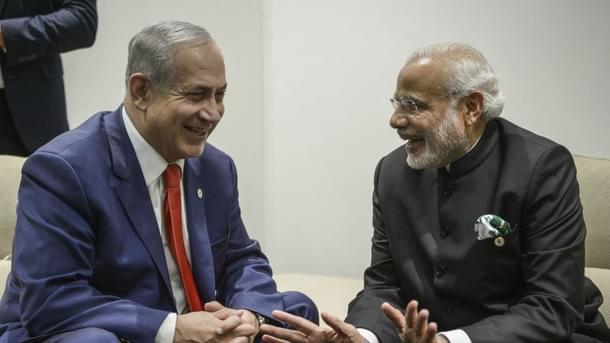Insta
Israel: PM Benjamin Netanyahu To Continue 5th Term In Office; Set To Form Govt Under Power-Share Deal
IANS
May 11, 2020, 11:06 AM | Updated 11:06 AM IST
Save & read from anywhere!
Bookmark stories for easy access on any device or the Swarajya app.


After securing support from a majority of lawmakers last week and dodging several legal hurdles, sitting Israeli Prime Minister Benjamin Netanyahu will continue his fifth term in office as he prepares to form a government in the coming days under the power-sharing agreement.
The new government comes after over a year of political stalemate and three consecutive elections which led to inconclusive results, reports Xinhua news agency.
After weeks of political negotiations, Netanyahu who leads the ruling Likud party reached an agreement with his main rival Benny Gantz who leads the Blue and White party.
On Sunday (10 May), Netanyahu met members of his party and other coalition partners in order to assign cabinet portfolios.
The COVID-19 pandemic which broke out in the country after the third election was what brought the sides to finally reach a consensus after a year of paralysis.
The country, which has been under a caretaker government for a lengthy period, is now facing a major crisis and lack of a permanent government has made policy and budget decisions difficult.
Netanyahu and Gantz vowed to cooperate in order to lead the country through the crisis, including the major economic fallout which is now over-shadowing the health crisis.
A total of 248 Israelis have died of the virus and over 16,400 people have contracted it.
After weeks of severe lockdown measures, the economy is gradually being jump-started again.
Unemployment has reached a record high and there are many problems to be dealt with, including preparation for a possible second wave of the pandemic.
Before the pandemic, Netanyahu and Gantz had failed to reach an agreement despite several attempts.
Netanyahu faces three indictments of corruption and is scheduled to appear in court at the end of this month.
From the beginning of his political career, Gantz vowed not to sit in a government with a leader under indictment.
Three election campaigns later, Israel found itself at an impasse.
In the latest 2 March election, Netanyahu fell just a few mandates short of grasping the 61-member majority needed to rule the 120-member Knesset.
Gantz was also incapable of forming a coalition and decided to turn on his single most prominent campaign promise that was not to serve with Netanyahu.
Gantz's U-turn led to the disintegration of his party, leaving him to lead just his faction with 15 members, less than half of the original list. The circumstances led to a major change.
The new government is slated to be the largest in Israel's history with between 34 to 36 ministerial portfolios. The excess comes at a time when the projections for the Israeli economy are that it will shrink in 2020 and there are approximately one million unemployed people.
According to the deal, the sides also agreed that Israel could begin to move on annexation of parts of the West Bank as early as July as part of the implementation of the US peace plan for Israelis and Palestinians.
Gantz and Netanyahu seem to have little differences on the matter.
This news has been published via Syndicate feed. Only the headline has been changed.





